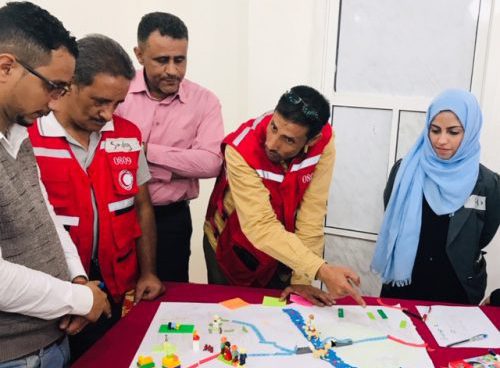
Photo: Yemen Red Crescent Society
»These concepts have greatly expanded my perception, I began to feel that psychosocial support and psychological first aid are topics as important as physical first aid.«
– Amani al-Rumain, field officer, Yemen Red Crescent Society
Amani al-Rumaim and her fellow volunteers participate in a three year programme called Community Services in Health and Action for Resilience C-SHARE funded by the EU Development and Cooperation (DEVCO) and developed by Danish Red Cross with technical support from the PS Centre.
It is implemented by Yemen Red Crescent Society serving vulnerable communities and local authorities in five governorates.
A wide range of PS disciplines
Staff and volunteers are trained in psychological first aid, community-based psychosocial support, self-care and peer support, minimum standards for protection, gender and inclusion, how to plan and implement awareness raising and psycho-education sessions, child friendly spaces and community-led social events. Safety and well-being of Yemen Red Crescent Society staff and volunteers is also promoted as they are themselves directly affected by the conflict in Yemen.
“We aim to empower and enable staff and volunteers to provide psychosocial support to their communities. We train Yemen Red Crescent Society primary health care staff on how to identify mental health problems and disorders to better support people with mental health problems”, says Ahlem Cheffi, technical advisor, PS Centre.
Now, the psychosocial team from Yemen Red Crescent Society is ready to provide psychological first aid themselves and thus to train other volunteers and local communities in providing psychological first aid.
The needs for improving mental health and psychosocial support in Yemen are vast, but poorly funded.
With over 24 million in need of aid, Yemen is the world’s single largest humanitarian crisis.
The Red Cross Red Crescent Movement is working tirelessly to provide food, clean water, and essential household items as well as support health structures and improving the living conditions within Yemeni prisons.
Yemen has almost no mental health services.
More than half of all health facilities have closed or are only partially functioning.
According to the World Health Organization (WHO), in 2017 only 40 psychiatrists were working in the country – or put another way: there is approximately one psychiatrist for every 700.000 people.
